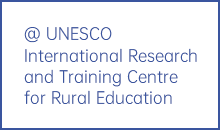Education Open Talks are dialogue series initiated by the UNESCO International Research and Training Centre for Rural Education (“UNESCO INRULED”), inviting experts worldwide to discuss educational issues. In response to the “Futures of Education” global initiative, UNESCO INRULED launched the dialogue series of “Future of Education and Education for Rural Revitalization”, aiming at stimulating discussions on the effective measures and mechanisms of rural education for future development. This webinar is the first event of the dialogue series.
The formation of small schools in rural areas is the corollary of urbanisation and population migration and a common phenomenon in most impoverished regions. However, many questions still remain unanswered: What kind of policies and institutional environment are in favor of the development of small schools? What are the roles of local, municipal and provincial governments in the management of small rural schools? Do ICT facilities have potential for small schools?
Although East Asian countries have achieved considerable achievements in the popularisation of high-quality education durting the past decade, social issues such as immigration, low birth rates, and efficiency-driven education policies still are posing huge challenges to rural education in East Asia. In addition, the COVID-19 has brought more difficulties and uncertainties for East Asian countries to build a resilient, inclusive and quality rural education system.
Given this context, UNESCO INRULED and Tohoku University jointly organised this webinar on the afternoon of October 30 2021, discussing the policies and practical cases of rural small schools in China, South Korea and Japan, and sharing the experience of rural education development. Participants of this webinar were: Mr. Robert Parua, Education Programme Specialist of UNESCO Beijing office, Professor Tomohiro Yakuwa, Dean of the Graduate School of Education, Tohoku University, Japan, Professor Zeng Xiaodong, Executive Director of the UNESCO INRULED, Dr. Zhao Tongtong, Postdoctoral Fellow of the UNESCO INRULED, Professor Joon Yul Choi, the School of Education, Gongju University, Korea, Professor Yasuyuki Tamai, Hokkaido University of Education, Research Institute for Remote and Small School Education (HUE RISE), and Professor Philip Roberts, Rural Education and Community Research Group of the University of Canberra. The seminar was hosted by Dr. Jing Liu from the Graduate School of Education, Tohoku University, Japan.
The webinar began with opening addresses from Professor Tomohiro Yakuwa and Mr. Robert Parua, both of whom mentioned the significance of the rural population migration and the improvement of quality of rural education. Mr. Robert Parua pointed out that the core of the 2030 Agenda is “Leaving No One Behind”, calling on attentions to the needs of the rural population in the 2030 Agenda of Sustainable Development. He proposed that rural education seminars could explore deeper into the opportunities, equity, and inclusion issues in the rural context.
Following that, guest speakers from China, South Korea and Japan shared the policies and practices of rural small schools in their country. Professor Zeng, the representative from China, illustrated the background of China’s rural development and rural education in this context. Afterwards, Dr. Zhao shared a case study on teachers’ personal experiences, reflecting the tension and challenges between teaching goals and rural development limitations. Professor Choi, the representative from South Korea, shared South Korea’s rural education policy framework and the partnership between Korean public schools and the private sectors. Japanese representative, Professor Tamai, introduced the implementation and policies for solving the problems of small rural schools in Japan at the school level.
After presentations from the three countries, participants were then engaged in a heated discussion. Professor Philip Roberts pointed out that all speakers mentioned population decline, population aging, economic recession and other issues, which are closely related to school education. In the meanwhile, the quality of school education is largely related to faculty resources and the teacher-student relationship. In this webinar, participants discussed the sociality of teacher-student relationship, teacher autonomy, government incentives and other aspects of the situation in Japan, South Korea and China, and shared their national experiences through case studies.
Mr Robert Pura revisited the vision of “Leaving No One Behind”in the 2030 Agenda. He believes that the needs of rural and urban disadvantaged populations must be fully included in the Agenda. In response to the theme of this seminar, he made several suggestions: (1) The bottom-up policy-making. When designing new education policies, the government needs to unite all stakeholders to engage in discussions fully; (2) The establishment of public-private partnership. The private sectors should participate in the reforms to improve the quality of rural schools; (3) The adoption of data-driven approaches. The statistics and data collected from rural schools and teachers, which is of assistance in the discussions with policymakers, will contribute to rural education. Finally, Mr Robert Pura mentioned that UNESCO would launch the Futures of Education Report on November 10, 2021. More key issues and discoveries about rural education will be revealed in this global report.
Prof. Zeng Xiaodong and Dr Zhao Tongtong: Experienced Teachers’ Differentiation in Rural Education Ecological System in China
On October 30, 2021, the UNESCO International Rural Education Research and Training Centre (“UNESCO INRULED”) and Tohoku University jointly organised a webinar to discuss small rural school’s policies and practical cases in China, South Korea and Japan, sharing the experience of rural education development. Professor Zeng Xiaodong, the Executive Director of the UNESCO INRULED, and Dr Zhao Tongtong, the Postdoctoral Fellow of the UNESCO INRULED, participated in the webinar and shared the findings of “Experienced Teachers’ Differentiation in Rural Education Ecological System in China”. The following are taken from their presentation.
The Process Of Urbanisation And The “Migratory Bird” Style Of Migration
The process of urbanisation has set a critical context for China’s rural education development. During the process, the proportion of the population living in rural areas has shrunk from 80% in the 1980s to 40% today. It means that the migrant population in rural areas is equivalent to the total population of the United States. Even provinces with relatively slow economic growth, such as Tibet and Guizhou, have experienced massive population mobility. Overall, China’s urbanisation rate has almost reached 50%, which is a change that cannot be neglected. Many people live in cities during most of the year but return to their hometowns during the Spring Festival and other holidays. The tremendous population flow in the festival season resembles migratory birds, which has become a spectacular phenomenon in China.
The phenomenon of left-behind children in rural areas
When focusing on the phenomenon of population mobility in the education field, we will find that many left-behind children in rural areas cannot move to cities with their parents due to various restrictions such as school enrollment and funding. The response of an education system to the demands of these children has become a considerable challenge. Most people believe that economic growth can solve all problems. However, nowadays, we have found that economic growth has brought more problems, and further discussion and research are still needed.
The Rural Teacher Is The Fundamental Element Of The Rural Education System
To understand rural teachers’ personal experiences, the shifting ecological system impact on their professional development, and the differentiation in their career, we conducted an empirical study in Gansu Province, China, focusing on the conditions of experienced teachers. According to interviews with 15 experienced teachers in small rural schools, we found three types of teachers: agentic, burnt-out, and peaceful.
Agentic Teachers
They are still actively involved in teaching work and value their continuous professional development. They want to enhance personal abilities and have high expectations of their students. Most of these teachers are math teachers or lead teachers because they both are fully occupied. Mathematics is essential, said a math teacher interviewee. This view was also supported by school administrators, thus, more teaching and tutoring time was allocated to mathematics. Therefore, math teachers are busier than teachers of other subjects. The lead teachers are also very busy managing the entire class with a working schedule in the classroom from 6 am to 10 pm. Tired as they were, they still took initiatives in teaching.
Burnt-out Teachers
Burn-out teachers have shifted their priorities to things other than teaching, such as their families or the administrative work. A teacher said that he had turned the focus of his work to administrative work. Another teacher said that he now pays more attention to the family than the students. Such teachers were usually fed up with the toxic culture, complex relationships with leaders or colleagues, and productive-oriented evaluation. In addition, a teacher has expressed her disappointment with current students because they have no critical thinking, refuse to submit homework, and even sleep in class. These facts all lead to teachers’ exhaustion.
Peaceful Teachers
Peaceful teachers have accepted their current situation, and they have minimal expectations for their careers. According to the interview, this is not only related to their personality but also related to the limited access to resources. As a teacher said, “I wanted to use the ICT facilities, but most of them didn’t work. I know the school administrators have tried their best, but they don’t have enough money.” So he would “ask for no more”.
Rural teachers are the fundamental elements of the rural ecosystem. Their living and working conditions directly affect the learning process and results of rural children. Creating a more inclusive and teacher-friendly environment for those vulnerable rural teachers will be critical for rural education development.
Yasuyuki Tamai :Rural Education in Japan-Historical Development and Modern Role
Professor Yasuyuki Tamai from HUE RISE (Hokkaido University of Education, Research Institute for Remote and Small School Education) shared the “Rural Education in Japan-Historical Development and Modern Role” at the webinar. The following is taken from his presentation.
Due to the rapid decline in the Japanese population, schools are being consolidated and abolished, but small schools are increasing. In Japan, small schools are defined as schools with 11 or fewer classes, accounting for 45% of the total. The emergence of small schools is the outcome of the significant difference in Japan’s social capital between cities and remote areas. Disparities such as income and economic have affected the quality of school staffing, teaching materials and tools. Moreover, development problems still exist in rural areas, such as disadvantages of natural conditions, inaccessibility, economic poverty, cultural stagnation, isolated society and educational stagnation.
Impacted by the intensive economic growth, infrastructure was expanded in remote areas in terms of traffic, information, and culture. In urban areas, problems of urbanisation such as deterioration of living environment due to overcrowding, the estrangement of human relations, soaring housing costs, and intensifying competitive society have surfaced. In contrast, remote areas can take advantage of small populations, natural conditions, and regional characteristics. Hence, it is meaningful to develop rural education based on local characteristics.
The three features of remote schools in Japan are (1) Small in size, (2) Agriculture and natural resource, which are absent in urban areas, (3) Close relationships between schools and communities. However, the lack of sociability in small schools may also pose a challenge in improving students’ communication skills. Thus, corresponding measures were taken out, such as endowing children with clear roles and responsibilities, fostering their critical thinking, and providing opportunities for field research and experience activities.
Japanese remote schools are incorporating community activities that utilise local resources as educational activities. The effects of these community activities are as follows: (1) the ability to apply learned knowledge in society and real-life, (2) independence and ability to improve their communities, (3) in-depth understanding of real-life issues, (4) a more comprehensive view of the society and public life, (5) the recognition of common issues in Japan, (6) the unification of theory and practice, and (7) the integration into local culture and industry, as well as the cultivation of community pride. It is not a conventional view that only emphasises academic ability but an innovative approach to developing creative abilities by discovering and acting independently to solve problems. For this reason, it is necessary to cultivate these abilities in students and train teachers who can recognise the goodness of remote schools and thrive on their merits.
Joon Yul Choi: Korean educational policy for small rural schools
At the webinar, Professor Joon Yul Choi from the School of Education, Gongju University, Korea, shared the “Korean educational policy for small rural schools”. The following is taken from his presentation.
Since the 1960s, South Korea had begun the process of industrialisation, before which South Korea was an agricultural society. With a large population in rural areas, there were also many rural schools. However, a great number of rural residents flooded into cities during the industrialisation process, and the number of rural students dropped sharply, leading to the closure of many small-scale schools. The policy to close schools by integrating small schools in rural schools was implemented in 1982. 3855 schools have been closed down as of May 1, 2021, more than 90% of which were in rural areas. However, many rural residents and policymakers who wanted to revitalise rural regions pointed out the problems of the closure policy. They argued that rural areas would be activated only when rural education is alive. Thus, the Korean government has adopted various policy tools to solve the problem of small rural schools.
School Consolidation and Branch School Downgrade
In the early days, the consolidation standard was set to 180 or fewer students per school. From 1982 to 1998, 3743 schools were merged. Criticism was raised as almost 50% of schools in rural areas were closed. In August 1988, the government adjusted the standard to 100 students so that 971 schools were merged. But some people still consider this standard inappropriately high. The bar was then adjusted to 60 people in 2006. The reduction in the size of rural schools has prompted the Ministry of Education of South Korea to promote school merging to reduce fiscal expenditures vigorously. However, the rigid measures in the implementation and the strong opposition of residents and parents have also caused many challenges to this policy.
Downgrading branch schools is one of the policies when merging and operating schools. After the mergence of schools, the distance between students and school will be inevitably farther. Therefore, the government reorganised the school as a branch school to facilitate student management. From 1982 to September 2020, a total of 1854 schools in South Korea were reorganised into branch schools.
Green Schools
“Green Schools” are designed to create an educational environment that combines nature and digital technology for rural primary and secondary schools and improves the quality of education through the integration of human resources and the construction of special courses. “Green School” is a three-year policy implemented by the Ministry of Education of South Korea from 2009 to 2011. A total of 110 schools with 60-200 students were selected. In addition to advanced e-learning classrooms (including electronic blackboards, digital textbooks, computer rooms, etc.), these schools also have unique curriculums, excellent placements, local residents’ participation in school programs, and autonomy in student recruitment. After implementing the project, the student’s academic performance has been significantly improved. In addition, the number of students underachieving in primary education has decreased, students’ satisfaction, parents and teachers have improved, and the number of enrollment has also increased. However, due to budget limitations, the project could not be continued. In addition, since these 110 schools were selected from 1083 target schools, the injustice and discrimination issues have also caused criticism.
Year-round Care Schools
The Ministry of Education of South Korea promotes the Year-round Care School project to improve the scholastic ability of rural students. The project aims to establish a life stability network for rural students, improve basic education, and develop specialities and aptitudes to grow into a whole balanced person. The project has been implemented for three years. From 2009 to 2011, a total of 760 schools operated the project. In terms of the project results, students’ academic performance has gradually improved, and students’ satisfaction, parents and teachers have increased year by year.
Rural Excellent High School Development Projects
The Rural Excellence High School Development Project aims to narrow the education gap between urban and rural areas. Excellent high schools improve school facilities and operate various projects to develop into excellent high schools in the local area.
School Group Projects
The School Group Project is designed to support small schools in rural areas to operate the curriculum jointly. It is a project to support schools by combining them into one group. Each school can have a curriculum that is difficult to do with the neighbouring schools, providing various field trips and opportunities for students in the school group to operate and interact.
Rural Study Projects
The Rural Study project is supported by the Korean Ministry of Agriculture and aims to revitalise rural education. The project has contributed to small rural schools’ response to the crisis and the revitalisation of the countryside. However, it was pointed out that the project was run by the private sectors and lacked systematicity. Therefore, to revitalise rural education, the successful operation of the project still requires supporting laws and regulations and a systematic operation mode.
Private Policy
Private policy mainly focuses on solving the problem of rural school budget support. The case of Namhansan Elementary School is a model for the revitalisation of small schools in Korea. In 2000, the number of students at Namhansan Elementary School was 26, and it was designated as an abandoned school. Teachers, parents, and local residents have joined forces to save the school: including adjusting the curriculum based on the needs and levels of students, launching various activities, jointly creating an independent school education culture, and so on. At present, the school has been converted into an ordinary school with more than 130 students. Many rural areas are adopting the Namhansan model to revitalise elementary schools. It is worth mentioning that this measure requires the cooperation of government policies and non-governmental forces to achieve better results.
Dr. Joon Yul Choi has presented the status quo of small rural schools in South Korea by demonstrating various educational policies in South Korea. At the same time, more questions about the effectiveness of the policy are raised. How to ensure the effectiveness and sustainability of the management of small rural schools? That is still an issue worthy of further discussion.
Education Open Talks: Future of Education and Education for Rural Revitalisation is an ongoing dialogue series
The second event: Gender Equality Education In Rural Areas will be available in late November
Stay tuned!













